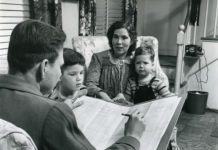Oklahoma may not seem to have a lot in common with the far-off country of Ethiopia, but dark liquids are important, economically, in both areas. Here we rely on oil and there, the African nation depends on coffee.
But, perhaps surprisingly, Oklahomans helped Ethiopia develop its agricultural industry, especially concerning every nine-to-fiver’s favorite beverage: coffee.
It began with President Harry Truman’s Point Four Program, specifically aimed at helping developing countries in the areas of science and industry.
Henry Bennett, Oklahoma State University president from 1928 through 1950, headed in a new direction when approached by Truman in 1951, says his grandson, David Bennett.
“(Henry) was selected by President Truman to be the head of the Point Four Program, which has now matured into USAID,” Bennett says.
With the help of the agricultural experts at Oklahoma State, Henry Bennett established schools in Ethiopia.
“When they got to Ethiopia, the idea was to spread farming techniques, like crop rotation – stuff that they were teaching at OSU,” Bennett says.
But expectations were a little different than the Oklahomans imagined.
“They realized that the education was at such a limited stage,” Bennett says. “They had planned on establishing a college, but the locals there weren’t quite ready, so they established a high school instead.”
Associate vice president of the division of International Studies and Outreach Dr. David Henneberry says that this first high school expanded into several, which then became feeder schools for a brand new university.
From those seeds, an industry was born.
“The homepage of this university’s website still contains information about OSU and the work that was done,” Henneberry says.
Today at OSU, Henneberry says that Bennett remains a strong presence.
“Henry Bennett’s work became a legacy item for OSU that the entire campus looks to concerning not just international development, but also trade and policy,” he says.
A prominently placed statue of Bennett stands on the main green, hopefully prompting students and staff to ask about him, Henneberry adds.
Recently, documentary filmmaker and Ethiopian-American Mel Tewahade released the first installment of The Point Four, which showcases and explores the connection between Oklahoma State University and Ethiopian coffee.
Bennett says that he was impressed at the recent screening of the documentary, which focused on interviewing those involved with the Point Four Program in Ethiopia.
“(The filmmakers) didn’t talk to administrators about theoretical ideas,” Bennett says. “They interviewed people who physically went there, literally to the fields, to work with the school’s students.”
Tragically, Henry Bennett died in a plane crash in 1951, travelling for his Point Four work. However, the accomplishments that he and other Oklahomans made in Ethiopia are still bearing fruit, says his grandson.
“The connection continues today,” he says. “Ethiopians still come to Oklahoma State to learn about agriculture; there’s still that positive relationship.”

























